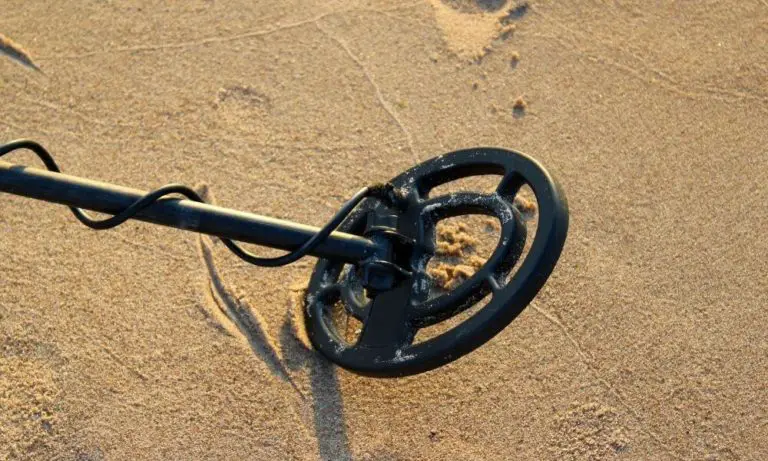Metal detecting is a fun hobby with a growing number of takers, and let’s just say I can’t talk about it enough! Metal detectors have a wide range of uses and capabilities. These machines are a must-have tool if you are looking to take up the hobby.
You can also find metal detectors in use in many professional settings. I am going to be discussing everything you need to know about the many types of metal detectors on the market. If you are looking for a new tool, you are going to have to think very carefully about your selection criteria. You can also learn tips on how to select the right one for your purposes.
What Are Metal Detectors?
A metal detector is an electronic device that is used to detect metal and gives off a signal when it does. They are the long gadgets that hover above the ground and produce a beep.
Before looking at what types of metal detectors there are, let’s cover what these machines are a little deeper and how they work in general. The different varieties also have notable functional differences as you are going to see.
Metal detectors can be used in recreational or professional settings to detect all kinds of metal. I love to use this gadget when I am out looking for coins and interesting artifacts, but these detectors are also very useful for military and security personnel in their line of work. Whether someone is looking for gold coins, hidden firearms, or any other metallic objects, there is a metal detector that can fulfill this purpose.
Every metal detector works using electromagnetism. These gadgets are designed with a coil running through them. When you turn on the metal detector, electricity flows through the coil. This activates an electromagnetic field around the device. When you encounter a metal object in the metal detector’s range, it is activated to send out its own electromagnetic field. When this happens, the detector gets the signal and sends out a loud beeping sound. That’s the sound we all long to hear because it means that you have found something, which could be what you were after.
How Many Types of Metal Detectors Are There?
There are four main types of metal detectors, and each one varies by what you can use it for, and how much it costs.
These are:
- Very Low Frequency (VLF) Metal Detectors
- Pulse Induction (PI) Metal Detectors
- Beat Frequency Oscillator (BFO)
- Industrial Metal detectors
In the next few sections, I go over each type of metal detector, how it works, and some of its main pros and cons.
Very Low Frequency (VLF) Metal Detectors Type
The first type of metal detector I want to touch on is the Very Low Frequency (VLF) detector. These metal detectors are commonly used and have many advantages. When it comes to being technologically advanced, the VLF is one of the top contenders. It has two spherical wire coils instead of one as other types of metal detectors have. These two coils function as the transmitter and receiver of the device’s magnetic field and the metal’s magnetic field, respectively.
One of the things I like the most about VLF metal detectors is that they can differentiate between different types of metal and send out a different signal based on what they detect. The range of a VLF detector can extend to 2 feet in the ground.
VLF metal detectors are widely used in the entry-level market, so you can find them as low as $100. They are simple enough to figure out for the beginner, and there are budget-friendly models you can buy for your kids. You can find VLF metal detectors that are waterproof, but the next type of metal detector I am going to cover is much better suited for this purpose. Learn more about the pros and cons of this type of metal detector up next.
Pros
- Affordable price point
- Advanced technology and with multiple variations and purposes
- Child and beginner-friendly and easy to use
- Long battery life
- Lightweight
- Durable
Cons
- Single-frequency
- Does not perform as well in mineralized soils
As you can see, VLF metal detectors have a lot to offer, and this is the reason that they are the most popular and most abundant types of metal detectors on the market. They are particularly loved in the hobbyist market.
Pulse Induction (PI) Metal Detectors
The second type of metal detector we are going to look at is the Pulse Induction (PI) metal detectors. While VLF metal detectors are popular for personal use, PI metal detectors are more commonly used by security personnel. They are useful to detect hidden weapons.
As far as its structure, a PI metal detector can either have one coil or a set of coils, but these all work as a unit. This gadget works using echolocation, which means that the metal’s reaction is sensed as a pulse. The pulses are very short, but as many as several hundreds can be sent out each second.
PI metal detectors do not come cheap, and you could be looking at a starting price of around $1,000. What’s great about them is their ability to perform specialized functions in beach hunting and gold prospecting that VLF metal detectors are not able to do in these highly mineralized soils. They can also be waterproof, which means they are the preferred type of metal detectors near saltwater at the beach.
Here are some of the great and not so great facts about a PI metal detector:
Pros
- Works well in mineralized ground
- Excellent for gold prospecting and beach hunting
- Deep depth detection
Cons
- High price point
- Poor discrimination so not ideal for city use
- Heavy
If you find that a VLF metal detector is limited for what you need, you may want to upgrade to a PI metal detector.
Beat Frequency Oscillator (BFO)
The third type of metal detector is the Beat Frequency Oscillator (BFO). BFO metal detectors have two steel rings, which are covered by a twisted copper coil roller. One of the rings is small, while the other is large, and they operate at different frequencies. When a metal is detected, you can hear a humming sound that comes from the disruption of the frequency of the two rings.
The technology in this type of metal detector is the simplest. You are more likely to find a BFO metal detector in an electronic store, and it is also a great option for an entry-level metal detector.
Pros
- Low cost
- Easy to use and beginner-friendly
Cons
- Not suitable with ground mineralization
- Not as accurate as other types
As you can see, there are notable merits to using a BFO metal detector. It’s affordable, beginner-friendly, and you can even make it on your own. There are drawbacks, however, about where you can use it and how accurate it is.
Industrial Metal Detectors
Up to this point, I have been focusing on portable, hand-held stick types of metal detectors. After all, as a hobbyist, this is the type of metal detector I use. They should be easy to use and easy to carry around. The fourth type of metal detector is very different.
Industrial metal detectors can be found in a door frame at a security checkpoint or the exit to a store. The technology behind their operation is similar to the other metal detectors but presented in a different form. These door frame detectors can be useful when it comes to detecting dangerous weapons in public areas.
Specialty Detectors
If you are looking at a specific purpose and want a metal detector that is not one of the ones above, you may need a specialty metal detector. There are three main types of specialty detectors, and these are multi-frequency metal detectors, gold metal detectors, and waterproof metal detectors. Let’s go through each one of these.
Multifrequency Metal Detectors
Unlike VLF metal detectors, which only operate at a single frequency, these types of metal detectors can operate at multiple frequencies. These devices are excellent for hobbyists and professionals who want to detect metal in a range of different locations. You can change the frequency settings of these metal detectors, depending on where you intend to operate from. This rules out the need to have both a VLF and a PI metal detector. For all these benefits, you are going to have to pay a premium for this specialty metal detector type.
Pros
- Works well in multiple locations, including cities, mineralized grounds, and beaches
- Waterproof and can be used in the ocean
- Adjustable frequency
- Long depth detection
- Multi-variation and multi-purpose
Cons
- Expensive
- Efficiency and frequencies are not always clear upfront.
Gold Metal Detectors
If your heart is set on prospecting for gold, it is worthwhile to invest in a special gold metal detector. This way you can restrict the settings and capabilities of your metal detector to what you are after.
These types of metal detectors have a higher frequency range than most of the other metal detectors. They come as either a VLF or PI metal detector. Thanks to the high frequency, the detector is only alerted when you hit gold and not all the low frequency finds that you might encounter while prospecting.
Waterproof Metal Detectors
The last type of metal detector I am going to discuss is the waterproof metal detector. I have already touched on these a little bit while discussing the other types of metal detectors. There is a wide range of options in this category. With some of the waterproof metal detectors, their waterproof coils allow you to search for items in low water at the beach or river. There are also waterproof metal detectors that you can submerge fully in water, especially when going scuba diving. It is essential to read the finer details on a waterproof metal detector to find out just how waterproof it is before making the plunge.
In the summary table below, you can see the different types of metal detector and what it is good at detecting.
| Type of Metal Detector | Best Used for |
| Very Low Frequency (VLF) Metal Detectors | Gold and silver, coins, jewelry, relics |
| Pulse Induction (PI) Metal Detectors | Gold prospecting, beach hunting, concealed weapons |
| Beat Pulse Oscillator (BPO) | Entry-level use |
| Industrial Metal Detectors | Concealed weapons |
| Multifrequency Metal Detectors | Variable locations |
| Gold Metal Detector | Gold |
| Waterproof Metal Detectors | Detecting in low or deep water |
How to Choose the Right Metal Detector for me?
There is no shortage of options when it comes to metal detectors. You can find one for all kinds of professional and recreational purposes. Not every metal detector is going to be suitable for you. The first thing to do is know your purpose. You must also consider the price point, as this can vary tremendously. The other thing you should do when picking your next or first metal detector is to look carefully at its features and specifications to get a good idea of what it is capable of.
Know Your Purpose
Not everyone goes out to buy a metal detector for the same purpose. You may be a hobbyist like myself, but where you choose to go scouting and what you choose to look for can differ a great deal. Before you select a metal detector, you have to get clear about what you want to use it for. After all, you are going to be spending money on this gadget, so you want it to work well for your intended purpose. Here are some common purposes.
Hobbyist Metal Detectors
If you are taking up the hobby or have already been at it for some time, it’s important to know that your experience can be influenced by what kind of metal detector you choose. It should be easy to handle and carry around and must work well in the kinds of areas you wish to practice in. If you want to look for metal in or at the beach, then consider a waterproof model that can work in mineralized soils. Should you go the route of being a city hobbyist, then these capabilities are not going to matter as much.
Beginner Metal Detectors
If you have never had a metal detector before, you should be looking at a beginner-friendly or entry-level metal detector. Before you make your purchase, make sure you look at what features it has and how easy to use it is. The last thing you want is to end up with a complex gadget, as this can take a lot of the fun out of the activity. If you are buying a metal detector for a child, then this is a great option, as well.
The good news is that there are many beginner metal detectors for you to choose from. Ideally, you should be looking at VLF metal detectors and BPO metal detectors.
These are simple and affordable options to start with, but they may have limitations about where you can use them. They are not ideal to use in mineralized soils.
The table below can help you see what’s best for beginner use.
| Type of Metal Detector | Suitable for Beginners |
| VLF | Yes |
| PI | No |
| BPO | Yes |
| Industrial | No |
| Multifrequency | Depends |
| Gold Metal Detector | Depends |
| Waterproof | Depends |
Professional Metal Detectors
If you are a professional, picking a metal detector is something you need to think more carefully about. The main things you want to look at are accuracy and suitability for the environment where you work. You are likely to have a bigger budget, which allows you to find the perfect metal detector for the kind of work that you do.
For Coin Detecting
If you are looking to focus your metal detecting on coins, then you can narrow down your search for the perfect metal detector. Should you be looking for gold coins, in particular, then a gold metal detector is the best option.
For Jewelry Detecting
Maybe you intend to find jewelry. You must think about what metal is in the jewelry and where you intend to scout for it.
For Relic Detecting
Many metal detecting hobbyists and professionals in the archaeological space focus their attention on finding relics. In this case, you must also ask yourself similar questions. What metals are you looking to detect, and where might you be working from? From there, you can decide which metal detector is the best.
For Gold Detecting
If you are focused on gold, then a gold metal detector is the perfect one to use. It is a specialty metal detector with a high frequency and can save you the hassle of having a beep for every metal item you come across that is not what you are looking for. This makes it a worthwhile investment.
Know Your Price Range
It should be clear by now that metal detectors come at a wide range of price points Once you have zeroed in on what kind of detecting you want to do, you can start looking at the features of the different metal detectors available to see which one fits the bill. One thing that you should keep in mind when you are looking is your budget for a new metal detector.
Whether you want to spend hundreds or thousands, there is a great model on the market for you. You can explore this list of best metal detectors to see some of the top options available.
| Type of Metal Detector | Budget-friendly Option |
| VLF | Yes |
| PI | No |
| BPO | Yes |
| Industrial | No |
| Multifrequency | No |
| Gold Metal Detector | No |
| Waterproof | Depends |
Look at Features and Specifications
What differentiates one metal detector from the next is its type and its features, specifications, and capabilities. Let’s go through some of the main features that are important when picking a new metal detector.
Discrimination
The discrimination of a metal detector is its ability to differentiate between one type of metal from another. Some metal detectors such as the VLF are much better at this than others, so if this is important to you, it’s worth looking out for.
Target Identification
The next level up from discrimination is target identification, which allows a metal detector to let you know whether the object you have detected is jewelry, coins, or junk.
Ground Balance
There are always small traces of metal in the soil that can affect the accuracy of a metal detector. When a metal detector has an automatic, preset, or manual ground balance capability, it can ignore those metal traces and make your metal detection more accurate.
Frequency
A metal detector’s operating frequency is a measure of how many signals are transmitted and received by the device every second. Most metal detectors have a low frequency and are, therefore, suitable for scanning the ground deeper and detecting large buried items. High-frequency metal detectors, on the other hand, are good at detecting small objects but have less penetration depth.
Search Depth
A metal detector can only operate within a certain range, and this is known as the search depth. It can be anywhere in the range of 2-15 inches.
Sensitivity
The higher the sensitivity of a metal detector, the better it can detect metal objects from a specific distance.
Weight
The weight of a metal detector matters because it affects how easy it is going to be for you to use. This is very important if you are picking a metal detector for children or expect to have to lug it around for long distances.
There are so many other things you should consider when you are looking at your next metal detection. You should look at the construction and durability, reviews, ease of use, and anything else that is going to affect your experience and mission. Brand name and reputation also matter, so check out the best metal detector brands list.
Closing Thoughts
Taking up metal detection as a hobby can be an exciting adventure, but to make it work, you need the right tools for the trade. There are many types of metal detections, and each one offers something unique and helpful in the right setting. You should now have a clearer idea of the different metal detector types and what you should look for when picking a device.



